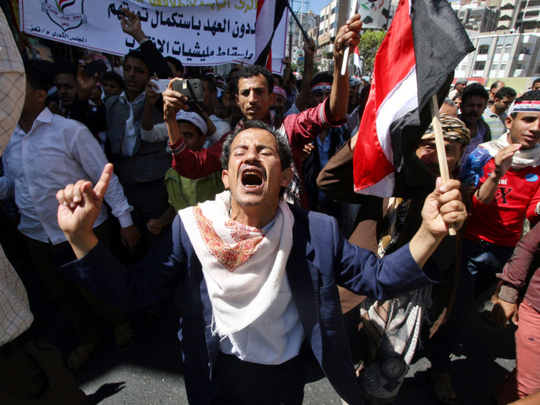
Sana’a: The United States, Britain and France said on Wednesday they were closing their embassies in Yemen amid the turmoil in the wake of the Al Houthi rebels’ takeover of the country.
The closures — almost four years to the date since the start of an Arab Spring uprising that ousted Yemen’s longtime autocratic ruler — were an ominous sign for the faltering, UN-brokered negotiations between the Houthi rebels and their political rivals, They also threatened to plunge this impoverished Arabian Peninsula country further into international isolation.
Yemen has been in crisis for months, with the Iran-linked Al Houthis besieging the capital, Sana’a, and then taking control. In January, the rebels put US-backed President Abd Rabbo Mansour Hadi and all his cabinet ministers under house arrest, leading to their resignations. Subsequently, the Al Houthis dissolved parliament and declared they were taking over the government.
On Tuesday, the State Department announced it had suspended operations at the US Embassy in Sana’a and relocated remaining diplomatic personnel “due to the ongoing political instability and the uncertain security situation.”
The embassy had been operating with only a skeleton staff for some weeks amid deteriorating conditions.
US officials said the embassy’s closure would not affect counterterrorism operations against Al Qaida’s Yemen branch — considered by Washington to be the world’s most dangerous offshoot of the global terror group. Yemeni officials, however, say the move was likely to curtail US military operations in the country.
Yemeni officials said on Wednesday that embassy staffers destroyed files and documents and disposed of firearms belonging to the embassy guards. They also handed over Sana’a’s Sheraton Hotel, where staffers had resided for several years, to the United Nations.
‘Increased risk’
Also on Wednesday, Britain’s Minister for the Middle East Tobias Ellwood urged British citizens still in Yemen to “leave immediately” as his country’s embassy evacuated its staff. The French Embassy said it would close on Friday.
“The security situation in Yemen has continued to deteriorate over recent days,” Ellwood said. “Regrettably, we now judge that our embassy staff and premises are at increased risk.”
Germany urged its citizens to leave Yemen, Foreign Ministry spokesman Martin Schaefer said on Wednesday.
The diplomatic missions of many Gulf Arab countries, which backed Hadi and opposed the Al Houthis, have already evacuated their staff.
In Sana’a, the Al Houthis patrolled the streets armed with Kalashnikov rifles and dressed in a mix of police uniforms and civilian clothes. They sealed off main boulevards and drove around in pickup trucks mounted with anti-aircraft guns. Shops closed early and people mostly stayed home.
The rebels dispersed several scattered anti-Al Houthi protests, beating the demonstrators and attacking them with knives as they tried to march toward the UN offices, according to witnesses. Several people were arrested, they said. The Yemeni officials and witnesses spoke on condition of anonymity because they were not authorised to talk to media.
Later on Wednesday, thousands of Houthi supporters marched in Sana’a, chanting, “Death to America, Death to Israel” — echoing similar slogans from Iran’s 1979 Islamic Revolution. The Al Houthis, traditionally based in northern Yemen along the border with Saudi Arabia, deny they are backed by Iran.
They also chanted in support of the rebels’ leader, Abdul Malek Al Houthi, who warned critics on Tuesday not to stand in the way of his movement and denounced foreign governments for removing their diplomats.
“Whoever harms the interest of this country could see that their interests in this country are also harmed,” Al Houthi said, speaking on the rebel group’s own Al Masirah TV network.
Away from Sana’a, Al Houthis pressed on with their power grab after taking control the previous day of the central province of Bayda, a gateway to the south. The Al Houthis now control 10 out of 22 provinces in Yemen.
Al Houthis have also been fighting Yemen’s Al Qaida branch and its loyalist tribes — and alliance that is expected to continue to challenge the rebels. In addition, Al Houthis have yet to take the oil-rich eastern Maarib province, where some tribes are fiercely against the rebels.
Thousands flocked to the streets in the southwestern city of Taiz — Yemen’s third largest and not under Al Houthi control — to denounce the rebels.
The rise of Al Houthis began last year when they descended from their heartland in northern Sa’ada province, fighting their way toward the capital and defeating tribal and military rivals along the way. In September, they flooded into Sana’a, and raided major state institutions and military bases.
With Yemen military in shambles and plagued with tribal rivalries, Al Houthis won the backing of ousted President Ali Abdullah Saleh — himself also a Zaydi — whose loyalists in the military are suspected of enabling Al Houthis’ advances.
Critics say Al Houthis are only buying time while making more territorial gains and setting their sights on the south, where there is a strong secessionist movement that has been demanding autonomy and a return to an independent state that existed before 1990.












